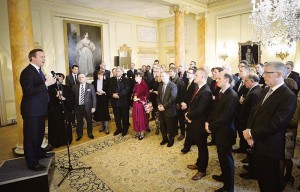We are not deeply concerned with political matters at Saints and Sceptics. It is just as well; while the different writers can worship as one, we cannot find a set of political policies which would unite us. When we compare our political beliefs with those held by our brothers and sisters across the Atlantic, matters become even more confusing. As much as we try to understand the American debate about the second amendment, “gun control” means something rather different for Northern Irish politicians. We are, naturally, in agreement about issues on which scripture speaks: marriage and the sanctity of life, for example. Beyond that point, we must agree to disagree.
So, we generally hesitate to comment on political matters. However, the British Prime Minister has trod on a political land-mine by suggesting that England’s green and pleasant land ought to spend a bit more time at Church. Secular humanists are, predictably, critical. We’ll address their concerns in other posts, but here we’d like to say something about the Prime Minister’s comments.
We can agree with his remarks to some extent. One cannot understand the present without understanding the past; one cannot understand British history unless one understands Christianity. Christian ideas and institutions have shaped the country’s path through history. Britain has a Christian heritage; in that sense Britain is a Christian country. It is part of the Church’s calling to help the poor, so it is important to note that Christian social action changes people’s lives, improving the spiritual, physical, and moral state of our country. However, there is more to the Christian faith than charitable activity; and since the Prime Minister does not mention the central message of Christianity, one could easily get the impression that the Christian faith is simply a set of social values.
In fact, the Christian gospel is an awful and wonderful message. It is both terrifying and exhilarating: we are loved with infinite passion by a creator who wants to possess us for himself. God demands our personal, unconditional surrender because of who we are and who he is. Moral and spiritual improvement is beside the point: we could never do enough to spiritually or morally merit God’s love. Instead, God the Son became one of us, died, and rose again to pay the moral and spiritual price we could not pay. Take this message away and church would be little more than a noble and beneficial hobby; a worthwhile way to spend one’s weekend, combining a respect for tradition with altruistic ideals.
Yet Christianity -real Christianity- is deeply offensive and not a message that would be popular with any electorate. God’s law demands that we love God with all our hearts and our neighbour as ourselves: a demand that is at once reasonable and unachievable. So the gospel demands we turn to God and trust in Christ. That cannot be reduced to being nice to people and giving 0.7% of GDP to the developing world. We need to be clear: at Saints and Sceptics we do not pray so that citizens will vote in a socially conservative manner; we do not pray that people will merely believe the Christian philosophical worldview. The Sadducees were social conservatives and the devil’s metaphysics are probably quite sound. Instead, we pray that people will personally turn to Christ and trust him for forgiveness and hope. Anything less than that simply isn’t Christian.
See also: Cameron and Christian Freedom
Cameron, Secularism and Sectarianism

